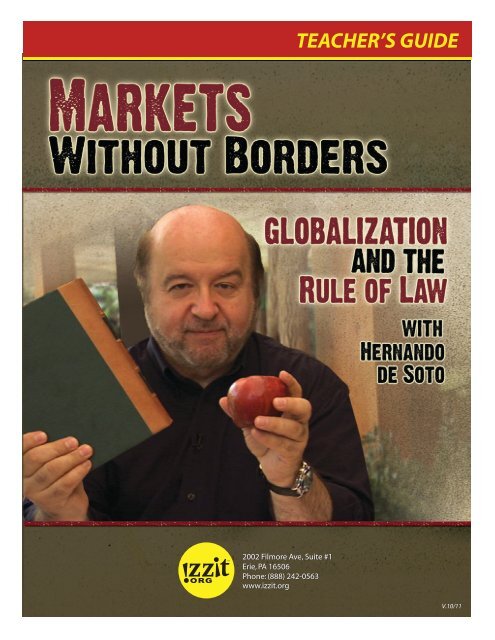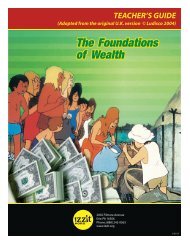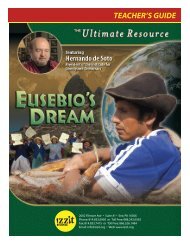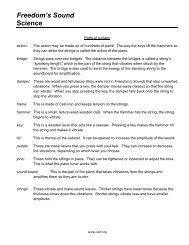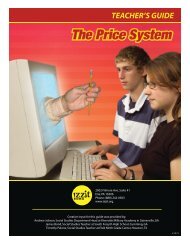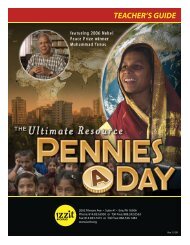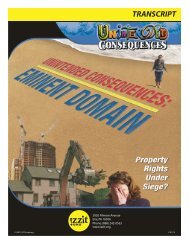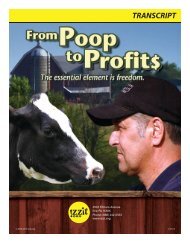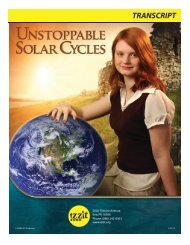Markets Without Borders Teacher's Guide - Izzit.org
Markets Without Borders Teacher's Guide - Izzit.org
Markets Without Borders Teacher's Guide - Izzit.org
You also want an ePaper? Increase the reach of your titles
YUMPU automatically turns print PDFs into web optimized ePapers that Google loves.
TEACHER’S GUIDE<br />
2002 Filmore Ave, Suite #1<br />
Erie, PA 16506<br />
Phone: (888) 242-0563<br />
www.izzit.<strong>org</strong><br />
V.10/11
<strong>Markets</strong> <strong>Without</strong> <strong>Borders</strong><br />
Teacher’s <strong>Guide</strong><br />
This Teacher’s <strong>Guide</strong> includes the following:<br />
<br />
<br />
<br />
<br />
<br />
<br />
<br />
<br />
Suggested Lesson Plan<br />
Preview Questions<br />
Key Terms<br />
Viewing <strong>Guide</strong><br />
Discussion Questions<br />
Quiz<br />
Answer Key<br />
Enrichment Activities<br />
-------------------------------------------------------------------------------<br />
Suggested Lesson Plan<br />
These materials may be used in a variety of ways. For maximum benefit, we suggest the<br />
following lesson plan progression:<br />
● As a class, discuss the Preview Questions and define the Key Terms.<br />
● Distribute copies of the Viewing <strong>Guide</strong> for students to use as a note-taking tool during<br />
the video.<br />
● Play the video, pausing if needed to facilitate understanding and note-taking.<br />
● Review and discuss answers to the Viewing <strong>Guide</strong>.<br />
● Use Discussion Questions to spark class discussion, or assign these questions as<br />
homework.<br />
● Replay the video as preparation for the Quiz.<br />
● Administer the Quiz.<br />
● Optional: Assign Enrichment Activities.<br />
For a list of additional resources for use with this video, see www.izzit.<strong>org</strong>/products
<strong>Markets</strong> <strong>Without</strong> <strong>Borders</strong><br />
Preview Questions<br />
1. What are markets?<br />
2. What do you think of when you hear the word “globalization”?<br />
3. Has globalization succeeded? Has it failed?<br />
4. Has globalization benefited the poor people of the world?<br />
5. Why are some countries poor while others are rich?<br />
6. What does it mean to own something?<br />
7. Where do laws come from?
Name: ___________________________<br />
Date: ___________<br />
<strong>Markets</strong> <strong>Without</strong> <strong>Borders</strong><br />
Key Terms<br />
Asset:<br />
Capital:<br />
Collateral:<br />
Commodity:<br />
Communal:<br />
Division of labor (or specialization):<br />
Elites:<br />
Entrepreneur:<br />
Equity:<br />
Extralegal:<br />
Futures contract:<br />
Mosaic:<br />
Parochial:<br />
Predominant:<br />
Synonymous:
Name: ___________________________<br />
Date: ___________<br />
<strong>Markets</strong> <strong>Without</strong> <strong>Borders</strong><br />
Viewing <strong>Guide</strong>/Worksheet<br />
1. Poor people are migrating to the world’s __________________ in astounding numbers.<br />
2. Hernando de Soto wants to understand the root causes of __________________ and to do<br />
something about it.<br />
3. What gives the apple its global attributes is the __________________.<br />
4. Hernando de Soto wonders if the notion of property rights is an imposition on<br />
__________________.<br />
5. 98% of __________________ in Tanzania operate outside the law.<br />
6. __________________ is not yet functioning in most of the world.<br />
7. __________________ are a great asset for humble people all throughout the history of<br />
the world.<br />
8. The root word of capital comes from caput, meaning __________________.<br />
9. A house in a developing country is a shelter, which cannot be __________________.<br />
10. Capitalism, globalization, and free markets are all about __________________ property<br />
rights.<br />
11. When you look at the big markets of the West, you see people dealing in<br />
__________________, or representations of value.<br />
12. What is missing is the ________________________________.<br />
13. Globalization is about __________________.
<strong>Markets</strong> <strong>Without</strong> <strong>Borders</strong><br />
Discussion Questions, Page 1<br />
1. Explain the title of the video.<br />
2. Who is Hernando de Soto? What does he do? What are his goals?<br />
3. How is the spread of property law related to globalizing economies?<br />
4. “The poor are locked out of the system.” What system is this? What is locking them out?<br />
5. What are the consequences of poverty?<br />
6. How do people hope moving near the cities will make them part of globalization?<br />
7. What makes an apple “globalized,” according to de Soto? How does this happen?<br />
8. Is tribal life consistent with participation in a global economy? Explain.<br />
9. How is specialization related to participation in the global economy? Why do people<br />
specialize? Do you think it is natural to do so?<br />
10. Besides in the economy, where else do we deal in abstract symbols rather than concrete<br />
things? Give three examples. How do these abstractions help us to understand and use things?<br />
11. Is anything lost when we move from concrete dealings to dealing in symbols? Explain.<br />
12. How does globalization allow people to deal in symbols? Why are these symbols so highly<br />
mobile?
<strong>Markets</strong> <strong>Without</strong> <strong>Borders</strong><br />
Discussion Questions, Page 2<br />
13. What is the difference between capitalism and globalization? How are the two related?<br />
14. “Value is locked up.” What gives things value? If value is “locked up,” what does it mean<br />
to unlock the value in a thing? How do property titles help us do this?<br />
15. What difference does a title to a house make for its owners?<br />
16. What is the difference between people trading with each other and being part of<br />
globalization?<br />
17. What is globalization? What does a place look like if it is not part of globalization?<br />
18. De Soto asks why people in Africa aren’t as prosperous as people from the North, then lists<br />
explanations that other people have offered, such as colonialism, corruption, capitalist<br />
exploitation and dependency. What do you think the best answer is?<br />
19. “Civilization has always been designed by elites.” Is globalization a civilization? What<br />
elites, if any, have designed it?<br />
20. What do non-elites have the capacity to do to globalization, according to de Soto?<br />
21. What evidence does the film present to show that Africa’s poverty is due to the absence of<br />
property rights and inclusive business law? Is this good evidence?
Name: ___________________________<br />
Date: ___________<br />
<strong>Markets</strong> <strong>Without</strong> <strong>Borders</strong><br />
Quiz, Page 1<br />
1. According to de Soto, globalization is threatened by<br />
A) people who believe it is an imposition on them<br />
B) its own impracticality<br />
C) people who feel left out of it<br />
D) tribal customs<br />
2. According to de Soto, civilization has always been designed by<br />
A) governments<br />
B) religious leaders<br />
C) elites<br />
D) warriors<br />
3. In a capitalist system, people deal in<br />
A) apples<br />
B) cattle<br />
C) symbols<br />
D) hopes<br />
4. Thirty-three of the world’s poorest countries are in<br />
A) Asia<br />
B) Latin America<br />
C) The Middle East<br />
D) Africa<br />
5. What allows something to be globalized is<br />
A) free trade agreements<br />
B) the law<br />
C) ships<br />
D) paper work<br />
6. <strong>Without</strong> a title, the value of a good is<br />
A) nonexistent<br />
B) destroyed<br />
C) locked up<br />
D) unappreciated
Name: ___________________________<br />
Date: ___________<br />
<strong>Markets</strong> <strong>Without</strong> <strong>Borders</strong><br />
Quiz, Page 2<br />
7. When different people are responsible for different steps in production, this is called<br />
A) specialization<br />
B) entrepreneurship<br />
C) globalization<br />
D) the rule of law<br />
8. The film argues that Africa’s poverty is due to lack of<br />
A) property rights and inclusive business law<br />
B) work ethic and sophisticated education<br />
C) freedom from Western control<br />
D) resources and advanced infrastructure<br />
9. Capitalism is<br />
A) thriving throughout the world<br />
B) not functioning in most of the world<br />
C) resisted by most of the world<br />
D) on its last legs<br />
10. Futures contracts traded on the Chicago Mercantile Exchange allow people to trade<br />
representations of value, which is important because they can<br />
A) trade far more cattle than they could practically bring to the place<br />
B) not worry about the real value of the cattle<br />
C) learn to do complicated math<br />
D) avoid smelling manure
<strong>Markets</strong> <strong>Without</strong> <strong>Borders</strong><br />
Answer Key<br />
Viewing <strong>Guide</strong>:<br />
Quiz:<br />
1. cities<br />
2. poverty<br />
3. law<br />
4. Africans<br />
5. businesses<br />
6. Capitalism<br />
7. Cows or Livestock<br />
8. head<br />
9. mortgaged<br />
10. trading<br />
11. symbols<br />
12. rule of law<br />
13. relationships<br />
1. C) people who feel left out of it<br />
2. C) elites<br />
3. C) symbols<br />
4. D) Africa<br />
5. B) the law<br />
6. C) locked up<br />
7. A) specialization<br />
8. A) property rights and inclusive business law<br />
9. B) not functioning in most of the world<br />
10. A) trade far more cattle than they could practically bring to the place
<strong>Markets</strong> <strong>Without</strong> <strong>Borders</strong><br />
Enrichment Activities<br />
1. Play Win-Win, the izzit trading game, a fun and memorable way to learn about the<br />
benefits of trade.<br />
2. Have students research countries where the rule of law is well-established<br />
compared with those countries where it is not. Which countries are prosperous<br />
and which are poor?<br />
Resources can be found at http://www.freetheworld.com/index.html and<br />
http://www.freetheworld.com/pdf/Nov06EFWmap.pdf<br />
3. Use GapMinder World to show the growth of GDP in different countries over<br />
time. http://www.gapminder.<strong>org</strong>/for-teachers/<br />
Compare with the results in activity 2, above.
We are very interested to learn<br />
how you use our material. Please<br />
share your experiences or lesson<br />
plan ideas by visiting us<br />
at www.izzit.<strong>org</strong>.<br />
2002 Filmore Ave, Suite #1<br />
Erie, PA 16506<br />
Phone: (888) 242-0563<br />
www.izzit.<strong>org</strong>


